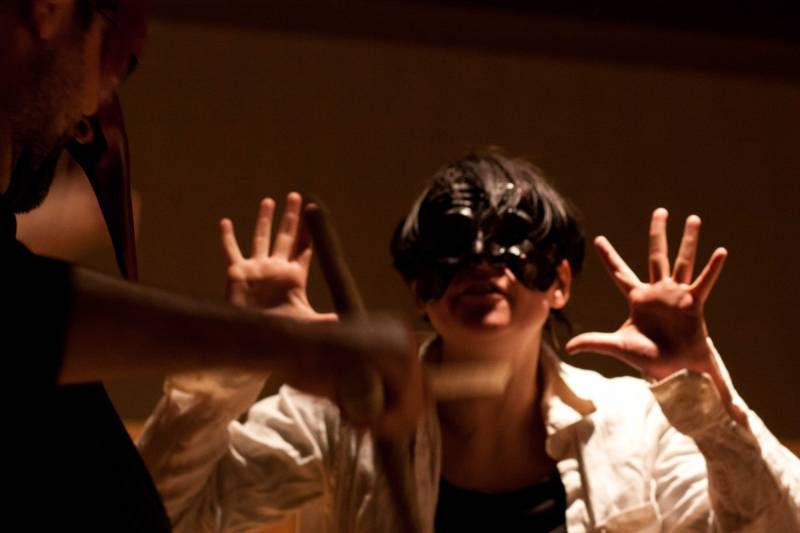Making Foreign Theater in a Foreign Land
“Niuiòrc Niuiòrc” is a journey through the Big Apple based on a true travel diary, while “L’Italia s’è Desta,” is a story that addresses two Italian social phenomena: the ‘ndrangheta and the Italian national soccer team.
“Niuiòrc Niuiòrc” is performed in Italian and in English, while “L’Italia s’è Desta” in Italian and Calabrese dialect with English supertitles.
In Scena! Italian Theater Festival NY was held at the Bernie Wohl Center at Goddard Riverside which often welcomes Italian Theater. “We are fortunate to have a renovated theater in our Bernie Wohl Center where we can bring unique and affordable performances to the entire community and also give artists a space to perform,” Susan Macaluso, Director of Community Arts Programs said, “The In Scena Italian Theater Festival consistently presents outstanding plays filled with artistry and social issues.We are delighted to bring art from another country to our theater and to continue to build a love and appreciation for the arts among our audiences.”
In addition to the two shows, the Bernie Wohl Center also welcomed a seminar on Commedia dell'Arte, a form of Italian theater that featured masked characters who improvised performances based on scenarios. Commedia dell'Arte dates back to the 16th century but it is still actual as you can still find its stock characters in sit coms on television today... no matter in what country you are. After one of the shows we had the opportunity to talk about the shows and the international language of theater with the actors.
This is the second time you participate to the festival, how was it compared to the first and why is it important that your show is seen here?
F.- This time around I felt the weight of responsibility even more. Being invited back in New York to open the first edition of In Scena! Winter, after having already opened the very first edition of the festival back in 2013, is a great honor and it makes me extremely proud. On top of that, there was also the awareness that I could not make any mistakes and I had the duty to meet some rather high expectations.
That’s why I really, really worked hard to prepare myself, taking care of the text and the show in every detail and rehearsing a lot. Still, when it was time to get on stage, I put all thoughts aside and I just let it all flow and the following three days of performances have been three great voyages/parties. Performing my "Niuiòrc Niuiòrc" in New York is extremely important because it is a great challenge; I always enjoy sharing it with the most diverse people. Every time I come to New York, which by the way is a city that I love, it is like closing a circle, but then another one opens up; like a lazy eight, the infinity symbol.
C.– This time, just like the first, Rosario Mastrota and I were incredibly excited to be presenting our work. We wished to have the same response from the audience and we did. Local audiences are curious and demanding as they are used to the avalanche of theatrical performances the Big Apple has to offer.
But it is wonderful to feel them breathe with you while you’re on stage. The story of “L’Italia s’è Desta” brings together three plot lines: diversity as personal drama, the 'ndrangheta (a criminal organization centered in Calabria) and the spectacle created by the media when reporting the news. Our show is both comic and bitter and it develops on a very physical and linguistic level.
There is only me on stage, but it is a dialogue more than a monologue due to the continuous interaction between the actor and the audience. I know for sure that American audiences are used to a constellation of different topics and the public is culturally used to seeing and hearing new stories. This is a new story for them.
Why is it important that Italian theater comes to the US?
C. - It's important because whoever brings Italian theater to an American stage is also bringing a rich theatrical tradition, made of various interpretative codes. It would be just great if this was an exchange, and also in Italy there would be the possibility to see different ways of doing theater. Unfortunately, there is not much room for international theater.
Tell us about acting in a foreign language.
F.- I love acting in English. This time around I even increased the percentage of English vs Italian by more than 50%. The reason behind this choice is that I knew there would be less Italians in the audience compared to the last time and then also because I like to challenge myself and raise the stakes. Using a different language is also a great expression of freedom, because it forces you not to fall into a routine, and you are surprised by the tones and sensations given to sounds and words that are not usually yours. All the smiles and happy faces that I see at the end of the shows give me confirmation that I have made the right choice. My next goal is to perform a whole show in English, which could definitely be a translation of this one, in order to be able to tour with it all over, but mostly back here in NYC.
How much self irony do New Yorkers have?
F.- I can honestly say, and I am not trying to be kissing anybody’s… or to be excessively xenophilous, that I adore New Yorkers. They possess such a receptiveness, an openness and respect towards the theater that at times is hard to find in Italy. I also think that people here have a great sense of self irony. Honestly, in “Niuiòrc Niuiòrc” I make fun of some behaviors that are typical of New Yorkers, but I never had the feeling that I was hurting their feelings, actually I often have heard them laugh out loud and make fun of themselves!
How is it different to perform for an Italian audience versus an American one?
C.- It doesn’t change much, but obviously Italian audiences have a different awareness on the issue of 'ndrangheta with respect to American audiences. In the show there are a few references to our society that Italian audiences can capture more easily and with some bitterness. Overall I can say that all audiences can get emotional, laugh and cry in the same way.








































i-Italy
Facebook
Google+
This work may not be reproduced, in whole or in part, without prior written permission.
Questo lavoro non può essere riprodotto, in tutto o in parte, senza permesso scritto.